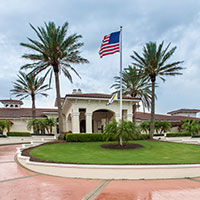 Grand Harbor members reach tentative deal to take over club from developer
Grand Harbor members reach tentative deal to take over club from developer
STORY BY RAY MCNULTY (Week of November 19, 2020)
Grand Harbor members could acquire full control of the club’s facilities and operations by Dec. 1 after negotiators reached an agreement-in-principle with the community’s developer last week.
The agreement came a week after 85 percent of the club’s 673 members voted against the developer’s previous proposal, which was not supported by the Grand Harbor Members Association’s board.
GHMA Board President Doug Sweeny said his panel endorses the new proposal, which was scheduled to be reviewed by the developer’s attorneys Monday and, barring any glitches, signed by representatives from the two parties.
Once the agreement is signed, the club could begin to partially reopen – all facilities and operations were shuttered by the developer on Nov. 7 – as Grand Harbor members conduct a vote on the new proposal.
Sweeny said Monday a second vote could begin as soon as this week and conclude by the end of the month.
“We’ve got to get out of the litigation phase and come to an amicable transition, which was our desire all along,” Sweeny said. “We want to take control of the club so we can reopen it. The lawyers can still stop this, but we’re hopeful they’ll all sign off on the agreement.”
Grand Harbor, one of the largest and most popular country-club communities in the Vero Beach area, has been owned and operated by Bayswater Development LLC – a subsidiary of billionaire Carl Icahn’s business empire – since 2004.
The GHMA has been trying to negotiate the transfer of the club to its members for more than a year, but the talks have been contentious at times and stalled often.
According to an email the GHMA board sent to members Friday, the developer did nothing to financially sweeten the previous, take-it-or-leave-it ultimatum that included none of the capital improvements, $4.5 million in cash or $6.5 million in real estate the members’ negotiators had demanded.
The developer’s only noticeable financial concession, in fact, was an agreement to forfeit any claim to 500-plus unsold memberships that aren’t worth anywhere near their nominal face value of $28 million – just as it was in the previous proposal.
So how is this deal better for members?
The new proposal eliminates a series of restrictions – including those regarding the use of the golf courses and recreational areas – imposed on members in the initial “Agreement To Sell,” drawn up when the club was founded in 1988 and transferred to Bayswater when it acquired the property.
If the new deal is approved, the membership would no longer be prevented from filing legal claims against the developer and would be granted full access to all of the club’s records before the transfer; members would be allowed to continue using the Grand Harbor name and logo and would acquire all club land.
Under the agreement, the GHMA would be permitted to replace the club’s developer-appointed Board of Governors with a “transition board” composed of five equity members, while still receiving from the company management support and assistance in facilitating the transfer of all required licenses and permits.
Sweeny called the proposal “the best deal we can get” if members hope to see the club reopened soon.
In its email to members, the GHMA wrote: “The transition board will work to reopen the club in stages as we address critical staffing, financial, insurance, procurement and permitting issues.
“We are targeting golf and tennis to return to last week’s [pre-closure] service levels and schedule, followed by the Beach Club reopening and food-and-beverage at the main club.”
When talks broke down earlier this month, the company shut down the club’s facilities and operations, claiming it lacked the funds needed to keep them open because more than 160 members had resigned and others were withholding their dues, creating a $6 million budget shortfall.
However, the GHMA board wrote in an email to members that the company had collected $3 million in dues – more than enough to cover the club’s operations.
Bayswater also threatened to declare itself “insolvent” and seek Chapter 7 protection in bankruptcy court, where the club’s amenities could be purchased by a third party.
One day after members overwhelmingly rejected Bayswater’s previous proposal, however, the developer embarked on a new round of negotiations that left Sweeny feeling optimistic about getting a better deal.
“After our last vote, I think the developer sensed the influence we have with our members,” Sweeny said. “This is a small community with only 600 members, and 500 of them belong to our association. If we get behind something, our members are probably going to go along.”
If the members do take ownership of the club, Sweeny said the GHMA has the funds needed to operate the facilities and expects to see many of the departed members return, though some have joined other clubs, such as the Vero Beach Country Club and The Boulevard Tennis Club.




